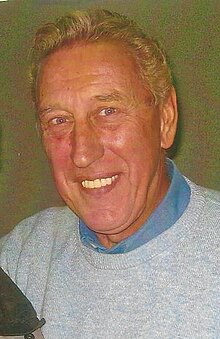Martin Chivers
 |
|||
| Personal information | |||
|---|---|---|---|
| Full name | Martin Harcourt Chivers | ||
| Date of birth | 27 April 1945 | ||
| Place of birth | Southampton, England | ||
| Height | 6 ft 1 in (1.85 m) | ||
| Playing position | Forward | ||
| Youth career | |||
| 1961–1962 | CPC Sports | ||
| Senior career* | |||
| Years | Team | Apps | (Gls) |
| 1962–1968 | Southampton | 175 | (96) |
| 1968–1976 | Tottenham Hotspur | 278 | (118) |
| 1976–1978 | Servette | 66 | (33) |
| 1978–1979 | Norwich City | 11 | (4) |
| 1979–1980 | Brighton & Hove Albion | 5 | (1) |
| 1980 | Dorchester Town | 5 | (3) |
| 1980 | → Frankston City (loan) | 2 | (0) |
| 1981–1982 | Vard Haugesund | 2 | (0) |
| 1982–1983 | Barnet | 2 | (0) |
| Total | 546 | (255) | |
| National team | |||
| 1971–1973 | England | 24 | (13) |
| * Senior club appearances and goals counted for the domestic league only. |
|||
Martin Harcourt Chivers (born 27 April 1945) is a retired English professional footballer from the 1960s and 1970s.
Chivers attended Taunton's Grammar School, Southampton, and wrote to his local club, Southampton for a trial. He spent a brief period in the club's nursery side, CPC Sports, and signed as a professional footballer in September 1962, making his debut against Charlton Athletic on 8 September 1962 (aged 17). He failed to score on his debut and his first goal came in a 4–1 defeat by Newcastle United on 6 April 1963 (in his third first-team appearance).
In the 1963–64 season, he became a regular starter and was the club's joint leading goalscorer (with Terry Paine) with 21 goals, as Southampton finished a disappointing fifth in Division 2. The following season, he was again a virtual ever-present, making 39 appearances with 17 goals as the Saints improved to fourth place.
In the 1965–66 season, he played an integral role as the club finally gained promotion to the top flight (as runners-up), scoring 30 goals from 39 games, generally from crosses provided by Terry Paine and John Sydenham. All his goals were scored from the first 29 games, and he failed to find the net after the end of February.
Once in the First Division, he played second fiddle to the Welsh striker, Ron Davies, scoring 14 and 13 goals respectively in the next two seasons. He became unsettled at The Dell and was soon being chased by many of the top clubs. Saints' manager Ted Bates was prepared to allow Chivers to leave, as he had a more than adequate replacement coming up through the ranks in Mick Channon.
In January 1968, Tottenham Hotspur manager Bill Nicholson signed Chivers for a club record fee of £125,000, which also made him the country's most expensive player at that time. The deal involved 24-year-old Frank Saul moving from White Hart Lane to The Dell.
...
Wikipedia
